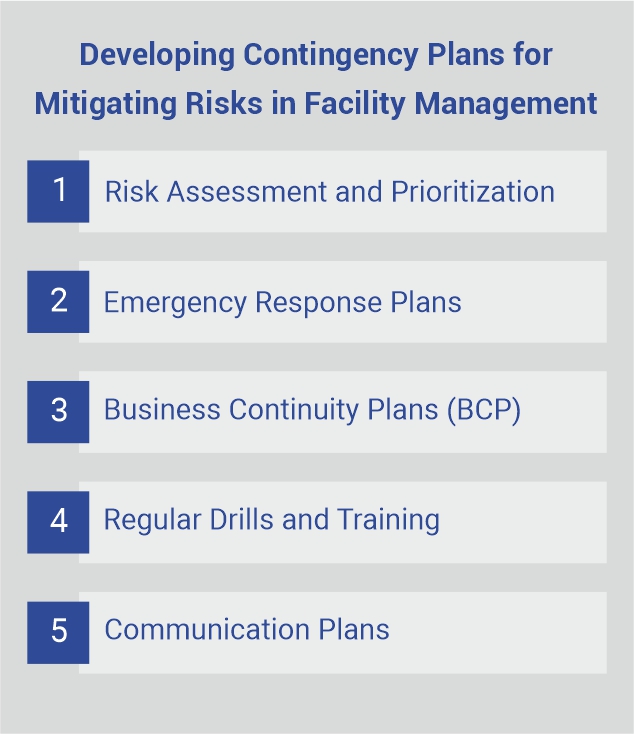Introduction:
In today's fast-paced business environment, risk management is a critical component of Integrated Facility Management (IFM). The ability to identify, assess, and mitigate risks can determine the operational success and sustainability of any facility. For Facility Management Companies in India, robust risk management practices are essential to safeguard assets, ensure compliance, and maintain smooth operations. This blog explores the importance of risk management in IFM, strategies for identifying and mitigating risks, and the development of effective contingency plans.
Understanding Risk Management in Facility Management Solutions
Risk management involves the systematic process of identifying, analyzing, and responding to potential risks that could negatively impact the operation of facilities. Facility Management service providers must address various types of risks, including physical, environmental, financial, and compliance risks. Effective risk management ensures that facilities remain safe, operational, and compliant with regulations.
Identifying Risks in Integrated Facility Management
1. Physical Risks:
Physical risks pertain to hazards that could cause harm to personnel or damage to property. These include fire hazards, equipment failures, structural issues, and safety incidents. Facility Management companies in India must conduct regular inspections and audits to identify such risks.
2. Environmental Risks:
Environmental risks involve natural disasters such as earthquakes, floods, and storms. Facilities Management solutions providers should be prepared to handle these risks, especially in regions prone to such events. Conducting environmental impact assessments can help identify potential threats.
3. Financial Risks:
Financial risks stem from budget overruns, unexpected maintenance costs, or economic downturns. Facility Management Solutions must include financial planning and monitoring to mitigate these risks.
4. Compliance Risks:
Compliance risks involve the failure to adhere to legal, regulatory, and industry standards. Top Facility Management Companies must stay updated with the latest regulations and ensure all practices are compliant.
Mitigating Risks in Facility Management Services India
1. Implementing Safety Protocols:
Safety protocols and standard operating procedures (SOPs) are crucial for mitigating physical risks. Regular training programs for staff on safety practices can significantly reduce incidents.
2. Regular Maintenance and Inspections:
Scheduled maintenance and regular inspections of equipment and infrastructure help in early detection of potential issues, thereby preventing major breakdowns or failures.
3. Financial Planning and Budgeting:
Effective financial management practices, including accurate budgeting and financial forecasting, help mitigate financial risks. Facility Management Companies should maintain a contingency fund to cover unexpected expenses.
4. Compliance Audits and Training:
Regular compliance audits ensure that all operations adhere to legal and industry standards. Training programs for staff on compliance requirements are essential to avoid regulatory penalties.
Developing Contingency Plans

A contingency plan is a proactive strategy that outlines the steps to be taken in response to unexpected events. Developing robust contingency plans is a hallmark of effective Facilities Management Services.
1. Risk Assessment and Prioritization:
Begin by conducting a thorough risk assessment to identify potential threats. Prioritize these risks based on their likelihood and potential impact on operations.
2. Emergency Response Plans:
Develop detailed emergency response plans for various scenarios such as fires, natural disasters, or security breaches. These plans should include evacuation procedures, communication protocols, and roles and responsibilities of staff.
3. Business Continuity Plans (BCP):
A BCP ensures that critical operations continue during and after a crisis. This includes identifying essential functions, setting up backup systems, and establishing remote working capabilities if necessary.
4. Regular Drills and Training:
Conduct regular drills and training sessions to ensure all staff are familiar with the contingency plans. This helps in testing the effectiveness of the plans and making necessary adjustments.
5. Communication Plans:
Effective communication is crucial during a crisis. Develop a communication plan that includes internal communication with staff and external communication with stakeholders, clients, and emergency services.
Mitigating Risks in Facility Management Services India
Case Study 1: Managing Fire Risks:
A leading Facility Management Company in India implemented a comprehensive fire risk management plan. This included regular fire drills, installation of advanced fire detection systems, and training for staff on fire safety protocols. As a result, the facility successfully mitigated fire risks and ensured the safety of its occupants.
Case Study 2: Handling Environmental Risks:
A top facility management company in a flood-prone region in eastern part of India developed an environmental risk management strategy. They conducted a detailed risk assessment, installed flood barriers, and established an emergency response team. During a severe flood, the facility was able to minimize damage and resume operations quickly.
Case Study 3: Financial Risk Management:
A facility management services provider faced budget overruns due to unexpected maintenance costs. By implementing stringent financial controls and setting up a contingency fund, they were able to stabilize their finances and avoid further disruptions.
Benefits of Effective Risk Management in Facility Management Solutions
1. Enhanced Safety and Security:
Effective risk management ensures the safety of occupants and the security of assets. This leads to a safer working environment and reduces the likelihood of accidents and incidents.
2. Operational Continuity:
By identifying and mitigating risks, facility management companies can ensure continuous operations. This minimizes downtime and enhances productivity.
3. Financial Stability:
Proactive risk management helps in avoiding unexpected costs and financial losses. This contributes to the financial stability and sustainability of the organization.
4. Compliance and Reputation:
Adhering to legal and regulatory requirements through effective risk management enhances compliance and protects the company's reputation. This is crucial for maintaining trust with clients and stakeholders.
Conclusion
Risk management is a critical aspect of Integrated Facility Management. For Facility Management Service providers, identifying and mitigating risks and developing contingency plans are essential practices to ensure operational success. By implementing robust risk management strategies, Facility Management Companies in India can enhance safety, ensure compliance, and maintain financial stability. Effective risk management not only protects the organization's assets but also contributes to the overall resilience and sustainability of the facilities they manage. As the industry continues to evolve, top facility management companies must prioritize risk management to navigate the challenges and uncertainties of the modern business landscape.
Industries we serve:
Automobile | Manufacturing | Pharmaceutical | Oil and Gas | Healthcare | Ancillary | FMCG | Education | Real Estate | Commercial | Mining | Hotels
Also read: Challenges and Solutions in Implementing IFM

